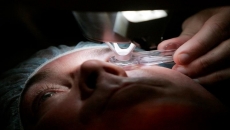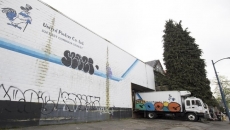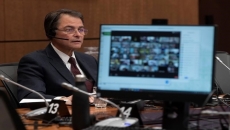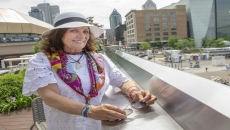The COVID-19 pandemic's economic toll came into sharper focus on Friday as several provinces revamped their efforts to root out the novel coronavirus and slow its spread.
Statistics Canada announced gross domestic product fell at an annualized rate of 8.2 per cent in the first three months of 2020 — the worst quarterly showing since 2009 — even though efforts to contain the novel coronavirus by shuttering businesses and schools didn't begin in earnest until March.
Many of those businesses are now reopening in a bid to re-employ some of the three million people who lost their jobs, putting workers and clients in close proximity and lending new urgency to the testing and tracing process.
"Moving forward it will become even more important to quickly identify and isolate this virus," Prime Minister Justin Trudeau said. "To do that effectively, we need to co-ordinate across the country."
He said some provinces were already asking for help with contact tracing and they're all working together on developing an app to ease the process.
To further those efforts, Ontario Premier Doug Ford announced a new testing strategy on Friday, targeting specific workers such as first responders, LCBO staff and people in businesses with outbreaks, including bringing mobile testing units to them.
The province says that next week community testing will also start in places with a high number of COVID-19 cases, with a van or bus going to affected workplaces, or simply directing employees to go to assessment centres.
"Ramping up testing means that we'll find more cases, and that's OK, because finding more cases means we'll contain the spread faster," Ford said. "We can't manage what we can't measure."
He added that once there's enough data to know where the virus is most prevalent, the province may look at a regional approach to reopening the economy.
Alberta took a different tack to slowing the viral spread, announcing plans to issue masks to the masses — with a fast-casual caveat.
Starting next month, the provincial government will begin handing out 20 million non-medical masks through A&W, McDonald's and Tim Hortons drive-thrus.
In New Brunswick, officials were working their way through a web of people who may have been infected by a health-care worker who did not self-isolate upon his return from a trip to Quebec.
Health officials announced three additional cases in the region on Thursday, bringing the total of cases in the cluster to six, including the health-care worker at the Campbellton Regional Hospital. One of the new patients also works in health care.
"Based on the contact tracing and the testing that we are doing, we will see more cases," said Dr. Jennifer Russell, the chief medical officer of health.
The province's Vitalite Health Network issued a statement saying the worker had come into contact with dozens of people at the hospital, including 50 employees.
The outbreak forced the adjournment of the provincial legislature Thursday and caused officials to delay a new phase of the recovery plan by a week.
Ottawa, too, announced new efforts meant to guide the country through the pandemic, including an additional $650 million for First Nations, Inuit and Metis communities. That adds to $305 million the feds had previously promised.
"Although we've made progress, there are still communities that are not properly equipped to handle a COVID-19 outbreak," Trudeau said. "We need to address that."
The new money will go toward hiring nurses and purchasing specialized supplies, enhancing an on-reserve income assistance program and building 12 new shelters for Indigenous women and girls fleeing violence.
Remote Indigenous communities are considered among the most vulnerable during the pandemic.
Residents often have no ready access to health care, and many live in overcrowded conditions that make it difficult to isolate those who may have been exposed.
While there have been some isolated outbreaks in such communities, officials' worst fears about COVID-19 spreading through First Nations have so far not materialized.
Transport Minister Marc Garneau also extended the moratorium on the cruise season, saying passenger ships with overnight accommodations for more than 100 passengers can't operate in Canadian waters until at least Oct. 31.
Such ships proved to be Petri dishes in the early days of the epidemic, accounting for thousands of infections.
By midday Friday, the number of cases in the country had climbed to 89,386, including 6,979 deaths.
Quebec reported another 530 cases of the virus, sending the total in that province above the 50,000 mark. It also announced another 61 deaths for a total of 4,363.






